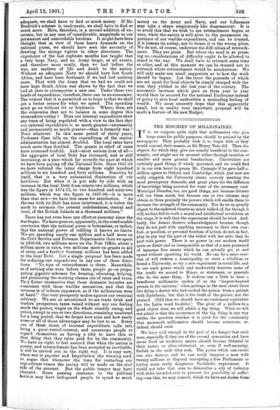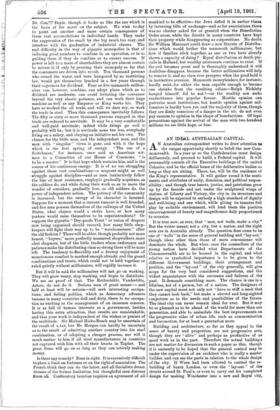THE MISCHIEF OF MILLIONAIRES.
IT is, we suppose, quite right that millionaires who give large sums for public purposes should be praised by the' newspapers. They probably wish it, to begin with, or they' would conceal their names, as Sir Henry Tate did. Then the objects for which they give are usually beneficial to the com- munity, and might not be secured either through taxation or smaller and more general benefactions. Universities are certainly good things if wisely governed, and we could find it in our own heart to praise Mr. Carnegie if he gave half-a: million apiece to Oxford and Cambridge, which just now are sadly crippled, the University chests scarcely meeting the most peremptory demands, and great plans for the diffusion' of knowledge being arrested for want of the necessary cash Municipal libraries, too, are good things, not because citizens' will use them much, but because one or two citizens May obtain in theta precisely the powers which will enable them to increase the strength of the community. Nor do we so greatly object to the endowed theatre so much talked of, for thotgh it will,wefear,fail to work a moral and intellectual revolution on the stage, it is well that the experiment should be tried. An& lastly, the donors deserve acknowledgment because, 'though they do not part with anything necessary to their own com- fort, or position, or personal freedom of action, do not, in fact, play in any way the part of the widow with her mite, they do part with power. There is no power in our modern world quite so direct and so irresponsible as that of a man possessed of immense free means which he can actually get at and spend without upsetting his world. He can by a mere exer- cise of will redeem a municipality, or start a rebellion, or found a University, or try a new experiment in social life, and to use such power wisely and moderately deserves some of the credit we accord to Kings, or statesmen, or generals who do the same thing. It sickens one a little to hear a beneficent millionaire spoken of as the "largest-hearted person in the universe" when perhaps in the next street there lies dying a doctor who had sucked the poison from a patient with diphtheria; but that is the fault of the praiser, not the praised. [Odd that we should have no customary equivalent for the Latin word laudatar.] The giver of a million to a good object does, we will admit, a big thing. What we will not admit is that the occurrence of the big thing in any way settles the question whether it is good for the community that mammoth millionaires should become numerous, or, indeed, should exist.
We have said enough in the past of the danger that such' men, especially if they, are of the second generation and have never lived on moderate means, should become Oriental in their tastes, or ultra-whimsical, or, even if well-meaning, foolish in the ends they seek. The power which can create can also destroy, and we can easily imagine a man with twenty millions at disposal corrupting a free Parliament or trying some really dangerous Socialistic experiment. it would not take that sum to demoralise a city of industry with doles intended only to prevent the possibility of suffer-. ing,—an idea, we may remark; which we have not stolen from; • Dr. ConDoyle, though it looks so like the one which is the basis of his novel on the subject. We wish to-day to point out another and more certain consequence a these vast accumulations in individual hands. They make the suppression of the small by the big much too easy, and interfere with the graduation of industrial classes. The real difficulty in the way of gigantic monopolies is that a inducing great numbers to combine in an operation, or in so guiding them if they do combine as to ensure success. If power is left to a mass of shareholders they are almost certain to misuse it, if only by pressing their monopoly so far that the consumers are driven into revolt. Ten thousand persons who owned the water, and were hampered by no restricting law, would get themselves lynched in a few years through their eagerness for dividend. Four or five mammoth million- aires can, however, combine, can adopt plans which as to dividend are moderate, can avoid irritating the consumer beyond his very elastic patience, and can work their huge machine as well as any Emperor or King works his. They have so worked the oil trade, and will, we dare say, so work the trade in steel. Then this consequence inevitably follows.
• The fifty or sixty or more thousand persons engaged in that trade are reduced to servitude. It may be a very comfortable and well-paid servitude; indeed while things go well it probably will be; but it is servitude none the less, everybody living on a salary, and obeying an initiative not his own. The chance for the little man, and the independent man, and the man with "singular” views is gone, and with it the hope which is the first spring of energy. "The use of a Scotehman," for instance, once said an American wit- ness to a Committee of our House of Commons, "is tO. be a master." It is that hope which sustains him, and is the source of his continuous energy. It is of no use struggling against these vast combinations—a sergeant might as well struggle against discipline—and as men instinctively follow the line of least resistance, emp1oy4s gradually acquiesce, as the soldiers do, and while doing their work eons to move the wonder of outsiders, gradually lose, as old soldiers do, the power of independent action. The potency of the community is increased, but the energy of its character is lessened. Suppose'for a moment that a current rumour is well founded, and five men possess themselves of the railways of the United States, what chance would a strike have, or how many porters would raise themselves to be superintendents? Or suppose, the gigantic "Dry-goods Trust" or union of drapers now being organised should succeed, how many little shop- keepers will fight their way up to be " warehousemen 7 after the old fashion ? There will be abler, though probably not more honest, "buyers," more perfectly mannered shopwalkers, more alert shopmen, but of the little traders whose endurance and patience make the distributing class so strong there will be nene left. The tendency to flaccidity and a drowsy enjoyment of monotonous comfort is marked enough already, and the grand combinations and trusts, which could not be held together or ruled quietly without millionaires, will rapidly increase it.
But it will be said the millionaires will not go on working. They will grow weary, stop working, and begin to distribute. We see no proof of that. The Rothschilds, Vanderbilts, Astors, do not do it. Serious men of great means and half at least will be serious—will seek interesting oceupa. tions, and failing politics, which as democracy advances become in many countries dull and dirty, there is no occupa- tion so exciting as the management of an immense concern. It is as full of human interests as a government, besides having this extra attraction, that results are unmistakable, and that your work is independent of the wishes or praises of the multitude. Sir Michael llicks-Beach may be uncertain of the result of a tax, but Mr. Morgan can hardly be uncertain as to the result of admitting another country into his steel combination, or of adopting a cheaper process, nor will it much matter to him if all steel manufacturers in countries not captured wish him with all their hearts in Tophet. The great firms will go on as long as they can actively making money.
Is there any remedy? None in sight. It is excessively difficult to place a limit on fortunes or on the right of association. The French think they can do the latter, and all Socialists dream dreams of the former limitation, but thoughtful men distrust is hem all. Confiscatory taxation requires an agreement of all mankind to be effective—the Jews defied it in earlier times by inventing bills of exchange—and as for associations, there was no charter asked for or granted when the Benedictine Order arose, while the Jesuits in many countriets have kept their property while disappearing as corporations. No dolibt Sir William Harcourt 'could draw a new Statute of Distribu- tions which would bother the mammoth millionaires, but how if families stick together, as one or 'two have' already shown a capacity of doing Equal distribution at death pre- vails in Holland, but wealthy aristocrats continue to exist. if the evil becomes great and is thoroughly understood it will doubtless disappear, because the better millionaires will help to remove it, and no class ever prospers when the good hold it in instinctive aversion. Mammoth moneylenders, for instance, hardly exist, for either the man capable enough to become one shrinks from the resulting odium—Ralph Nickleby hanged himself, did he not ?—or the wealthy son seeks readmittance into popular favour. Hostile opinion can pulverise most institutions, but hostile opinion against mil- lignaires is hardly born yet, and the majority of them, though they are dimly conscious of a danger in the air, do not even pay ransom to opinion in the shape of benefactions. Of legal precautions against the arrival of the man with two hundred millions we see little hope, or fear.







































 Previous page
Previous page